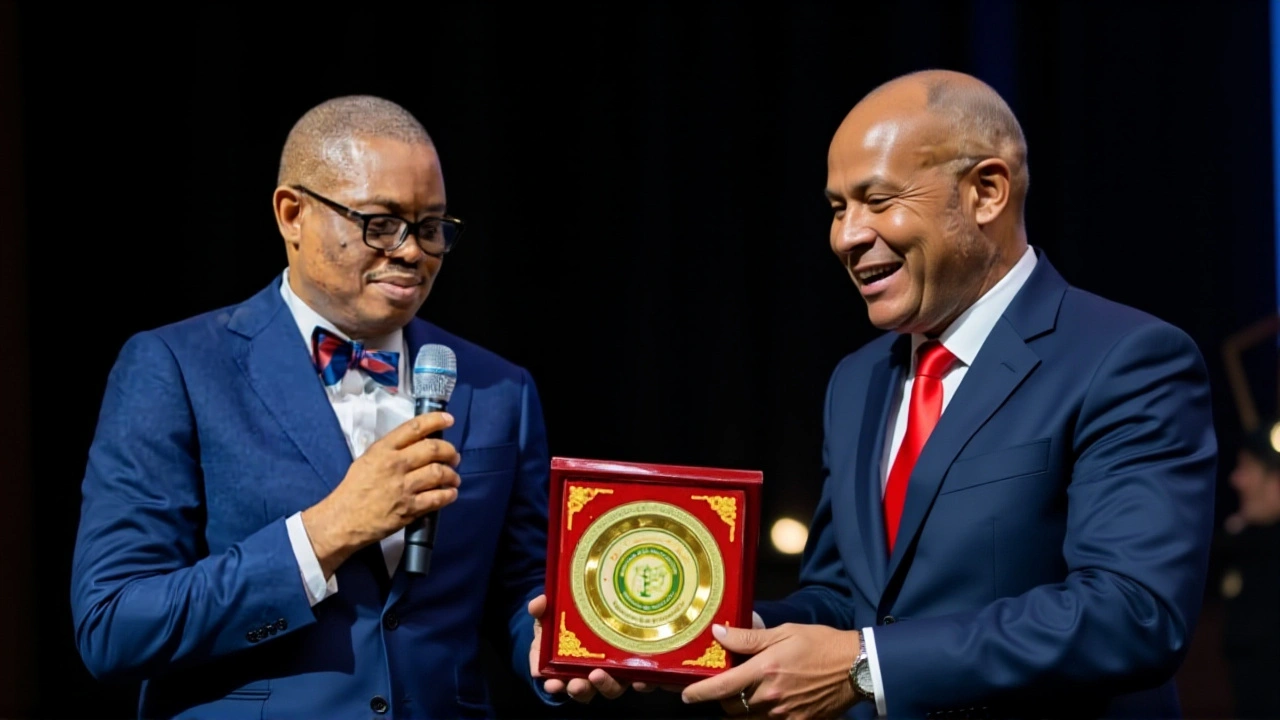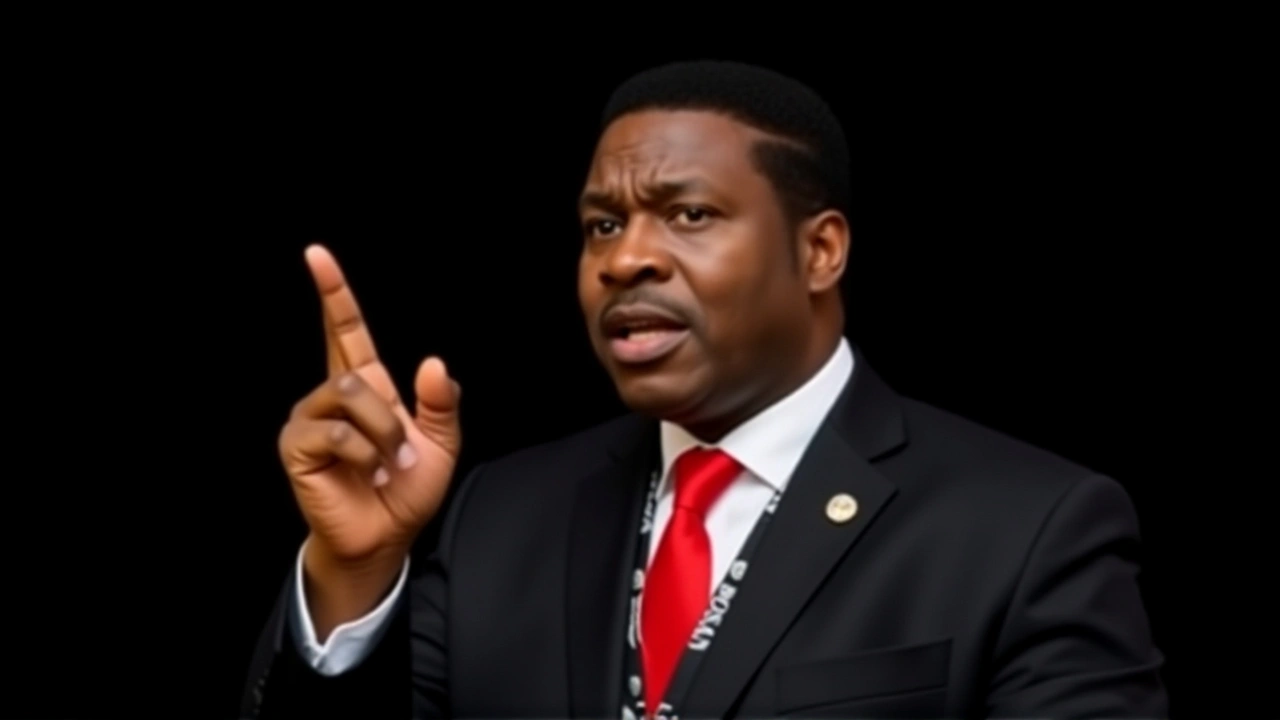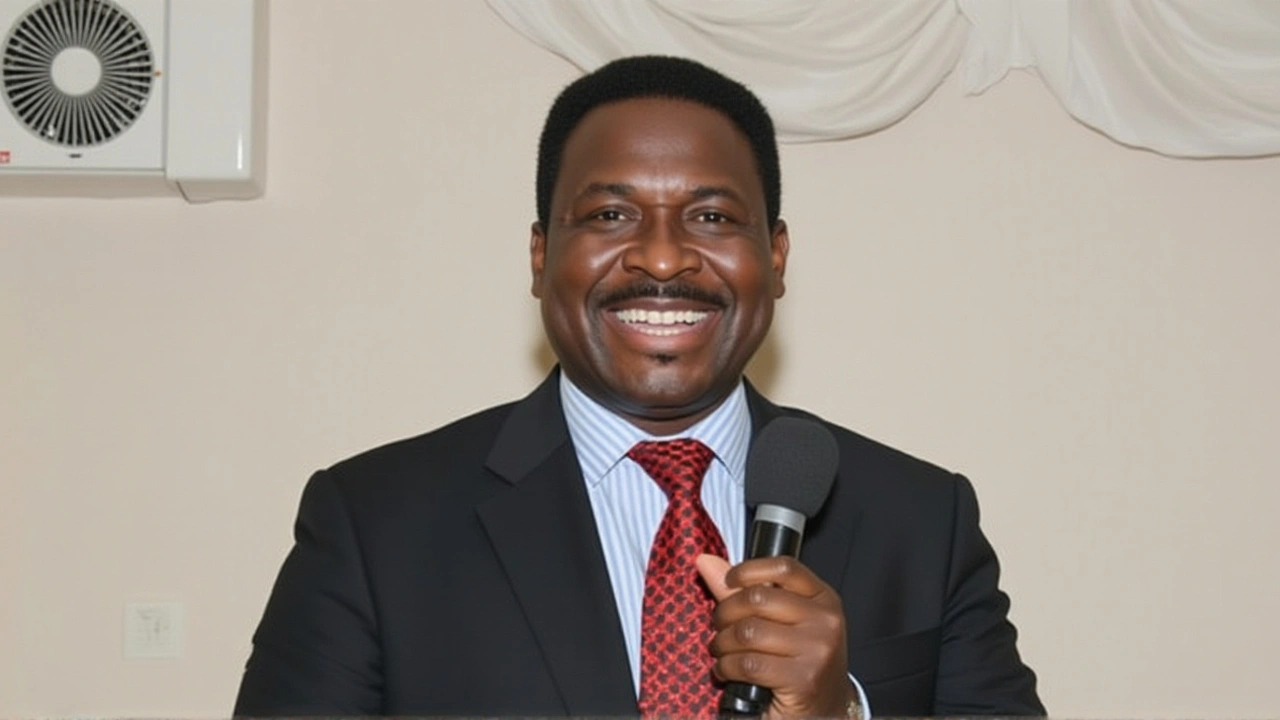When Mike Ozekhome, Senior Advocate of Nigeria stepped up to the podium at a human‑rights symposiumAbuja on December 11, 2024, he pointed a finger squarely at former President Muhammadu Buhari for what he called the template of ethnic patronage now being copied by President Bola Ahmed Tinubu. The claim, made under the banner of the International Human Rights Commission, sparked a heated debate about who really sets the tone for Nigeria’s "Yorubanisation" or "northernisation" of key posts.
Why the Debate Matters
At its core, the argument is about representation in a country that boasts more than 300 ethnic groups and 521 languages. Ozekhome reminded the audience that Nigerian politics is often reduced to a "tripod" of the Igbo, Yoruba and Hausa‑Fula blocs, a simplification that fuels resentment across the nation. "When I hear northerners complain about Tinubu's 'Yorubanisation', I ask: where were you when Buhari literally 'northernised' every position for eight years?" he asked, his tone mixing sarcasm with an uneasy truth.
From 'Northernisation' to 'Yorubanisation'
During Buhari’s 2015‑2023 tenure, several watchdogs noted a surge in appointments that favoured northern states or candidates identified as Muslim. Critics argued that this skewed the civil service and defence ministries, leaving southern and minority voices under‑represented. Ozekhome asserted that the pattern created a "dangerous precedent" that Tinubu, a Yoruba from Lagos, appears to be continuing, albeit with a shift in ethnic focus.
"It's not that Tinubu is picking friends; it's that the system he inherited rewards loyalty to ethnicity over merit," said Ozekhome, citing that more than 60 percent of the cabinet announced in August 2024 were Yoruba‑origin, according to an independent tally by the Center for Democratic Governance.
Minister Yilwatda’s Call for Unity
Joining the discussion, Nentawe Goshwe Yilwatda, Minister of Humanitarian Affairs, Disaster Management and Social Development tried to steer the conversation away from ethnic blame. "I have no reason to discuss ethnicity and religion; I have benefited from Nigeria's multi‑ethnic character," he said, referencing a recent incident in Bauchi where Christian and Muslim parents stood side‑by‑side during the Maitanasene riot to protect their children.
The minister added that President Tinubu instructed him to "give a human face to the ongoing reforms," a directive he interprets as an appeal for inclusive policy, not exclusive patronage. Yet his remarks were met with skeptical nods, as many observers noted that rhetoric alone cannot offset deep‑seated perceptions of favoritism.

Implications for Governance
Experts warn that persistent ethnic balancing acts can erode institutional competence. Dr. Amina Yusuf, a political scientist at the University of Lagos, highlighted that when appointments become a numbers game, merit‑based promotion suffers. "We are seeing a rise in bureaucratic delays and policy fragmentation," she said, pointing to a 12‑month backlog in the Ministry of Health's procurement process that began after the latest cabinet reshuffle.
Moreover, the perception of bias fuels regional protests. In early September 2024, youths in Kano staged a peaceful demonstration demanding greater representation, citing the same pattern Ozekhome described. The protests, while limited in size, underscore a volatile undercurrent that could flare into larger unrest if unaddressed.
What Comes Next?
With the next round of senior appointments scheduled for early 2025, civil society groups are lobbying for a transparent selection criteria that weighs experience over ethnic affiliation. The Nigerian Senate’s Committee on Public Service is expected to hold hearings in February 2025, where Ozekhome has pledged to testify.
Meanwhile, President Tinubu remains tight‑lipped about any shift in strategy, though his spokesman hinted at a "new merit‑based initiative" to be unveiled later this year. Whether that will satisfy critics like Ozekhome or merely serve as a win‑win for the President’s political calculations remains to be seen.

Historical Perspective
Ethnic patronage is not new in Nigeria. The first republic saw Northern dominance in the federal bureaucracy, while the second republic under Shehu Shagari attempted a more balanced approach, only to be upended by the 1983 military coup. The return to civilian rule in 1999 brought the "zoning" system, an informal arrangement designed to rotate the presidency among the three major regions. Yet each cycle has inevitably spawned its own version of "tribalisation," whether it be the Igbo‑dominated appointments under President Olusegun Obasanjo or the northern tilt under Buhari.
What distinguishes the current debate is the speed at which social media amplifies every appointment. A single tweet about a new minister’s ethnic background can trend within minutes, shaping public opinion before the official list is even published.
- 300+ ethnic groups, 521 languages
- 60% of Tinubu’s cabinet (as of Aug 2024) identified as Yoruba
- Buhari’s tenure saw ~55% of senior posts filled by northern candidates
- Human rights symposium held Dec 11, 2024, Abuja
- Senate hearings on appointment reforms slated for Feb 2025
Frequently Asked Questions
How does the alleged "Yorubanisation" affect southern Nigeria?
Southern states worry that a disproportionate share of ministries, especially finance and interior, will be controlled by officials with close ties to Lagos. This could skew resource allocation toward projects that favour the Yoruba heartland, marginalising minority groups in the Niger Delta and the southeast.
What led to the accusation of "northernisation" during Buhari’s rule?
Analysts point to a pattern where senior military, intelligence and infrastructure posts were filled predominantly by officers and technocrats from northern states. The practice was seen as a way to secure political loyalty and to balance previous southern dominance.
Who are the main voices calling for merit‑based appointments?
Civil society groups such as the Center for Democratic Governance, as well as academics like Dr. Amina Yusuf, have been vocal. They argue that transparent criteria, independent vetting panels, and periodic performance reviews would reduce ethnic bias.
What steps is the government taking to address these concerns?
The President’s office has promised a "new merit‑based initiative" slated for later 2024, while the Senate’s Public Service Committee plans hearings on appointment reforms in February 2025. No concrete legislation has been introduced yet.
Will the ethnic debate influence the upcoming 2027 elections?
Political analysts say that ethnic identity will remain a key mobilising factor. Candidates who can credibly claim inclusive governance may gain an edge, while those perceived as favouring their own group could face protests and reduced voter turnout.




The blame game is just another distraction, a way to shift focus from the real issue of patronage that has plagued every administration-Buhari, Tinubu, even the earlier civilian heads. Ozekhome’s rant sounds more like a personal vendetta than a constructive critique; it overlooks the systemic nature of ethnic balancing. By pointing fingers at Buhari, he ignores the fact that the same machinery is still in place, simply rebranded. The pattern of rewarding loyalty over competence has been evident in countless ministries, from defence to health. This isn’t a new phenomenon; it’s a relentless cycle that persists regardless of who sits in the oval office. The rhetoric about "Yorubanisation" is just an echo of the old "Northernisation" chant, both serving the same divisive narrative. While the symposium tries to portray a neutral platform, the underlying tone reeks of political opportunism. The public deserves more than scapegoating; they deserve accountability and transparent criteria for appointments. If we keep recycling blame, the civil service will remain crippled, and the nation will continue to suffer. The real question is: when will the power brokers finally prioritize merit?
History shows that power structures are resilient; attempts to label them by ethnicity only obscure the underlying mechanisms of patronage. The dilemma is less about Yoruba or Hausa, and more about who holds the levers of influence. When elite networks co‑opt regional identities, they secure votes while preserving their own dominance. One could argue that the focus on ethnic labels distracts from the deeper issue of institutional inertia. A merit‑based framework could diminish these tribal narratives, but only if it is insulated from political interference. In that sense, the symposium’s debate may be missing the forest for the trees.
Everyone needs to understand that the appointment process has always been a game of quid‑pro‑quo; the latest statistics simply make the pattern more visible. When you tally the numbers, the turnout isn’t surprising-politicians reward those who helped them rise, regardless of their ethnic background. The media loves a good headline, but the real story lies in the bureaucratic continuity that transcends any single president’s term. It’s a self‑reinforcing loop: loyalty begets power, power begets more loyalty. This is why any single‑party or single‑ethnic claim is a simplification of a much larger, entrenched system.
i think its important 2 see how these patterns affect the everyday folks, not just the politicos. many people dont even realize that their local services are getting worse bc of these top‑level decisions. its like a ripple effect that ends up in schools and hospitals. yeah, we gotta keep talking about it, but let's also push for real solutions, like transparent hiring processes.
It’s cool to see people caring about fairness. We can all hope that future leaders listen to the voices of the people and not just their own groups. If we stay positive and keep the conversation going, maybe we’ll see some good changes soon.
Wow, the whole thing really makes you think about how deep these patterns run. First, it’s clear that the appointment system has become a kind of ethnic lottery, where the draw is weighted by loyalty to the ruling elite. Second, the data from the Center for Democratic Governance shows a striking shift: from a roughly even spread to about 60% of senior posts now being held by people from the president’s own region. Third, this isn’t just a numbers game; it impacts policy outcomes, because ministers tend to prioritize projects that benefit their constituencies. Fourth, when competence takes a back seat, we see delays-like the twelve‑month backlog in the health ministry’s procurement that Dr. Yusuf mentioned. Fifth, the public’s perception of bias fuels protests, as we saw in Kano, and that can destabilize the nation if left unchecked. Sixth, social media amplifies every appointment, turning each name into a viral story that influences public opinion before any official list is even released. Seventh, the human‑rights symposium’s platform, while valuable, may inadvertently become another stage for political theater rather than genuine reform. Eighth, a merit‑based initiative sounds promising, yet without independent oversight it could become a rebranding of the same patronage. Ninth, the upcoming Senate hearings could be a chance for civil society to push for transparent criteria, but they need to be backed by concrete legislation. Tenth, the "zoning" tradition, meant to rotate power, might actually entrench regional expectations, making it harder to break the cycle. Eleventh, historical parallels show that every era repeats the pattern, from the first republic to today’s “Yorubanisation.” Twelfth, the real solution may lie in strengthening institutions that can function above partisan interests. Thirteenth, encouraging merit and accountability can help rebuild trust among Nigeria’s diverse populations. Fourteenth, we must also consider the role of the military and security apparatus, which often align with the dominant regional bloc. Fifteenth, in the end, a sustainable change will require a cultural shift where public service is valued for its own sake, not as a vehicle for ethnic advancement. 😊
We need to turn this discussion into concrete action. Start by demanding that any new appointment comes with a publicly available merit report. That way, citizens can verify qualifications and see if the process was transparent. Also, civil society groups should monitor the implementation of the merit‑based initiative and call out any back‑sliding. It’s not enough to hope for change; we have to hold leaders accountable.
You can’t ignore the drama.
It’s interesting to see how these patterns affect everyday life, not just high‑level politics. For example, when ministries are led by appointees who prioritize regional interests, funding for projects in other areas can get delayed or reduced. This trickles down to schools, hospitals, and infrastructure that people rely on. So while the debate seems abstract, its real impact is felt by ordinary citizens across the country.
Enough with the academic jargon! The real issue is that our country keeps handing power to the same groups, and it’s making us weaker on the global stage. This constant “Yorubanisation” or “Northernisation” is just a fancy way of saying we’re stuck in a tribal cycle that benefits a few and harms the many. We need to break this chain now.
Let’s channel this energy into something productive. Organize community forums where locals can share their concerns about representation and help draft proposals for merit‑based criteria. When people see that they have a voice, they’re more likely to support reforms and hold officials accountable.
Think about it: why do we keep revisiting the same grievances? Perhaps because the underlying structures never change. If we want lasting reform, we must challenge the status quo, not just rename it.
The merit‑based initiative sounds promising, yet the devil is in the details! A transparent vetting panel, clear performance metrics, and independent oversight are essential components-without them, the initiative may become a veneer for continued patronage. Moreover, continuous public reporting on appointments can foster accountability and deter covert favoritism. In short, rigorous implementation is key.
From a broader perspective, fostering inclusive mentorship programs within the civil service could help diversify leadership organically. By providing training and exposure to talented individuals from under‑represented regions, we can gradually shift the balance without overt political maneuvering. It's a long‑term strategy, but one worth pursuing.
I’ve seen similar patterns in other countries where regional loyalties dominate appointments. It’s a reminder that we need to keep the conversation open and inclusive, so that all voices feel heard and represented.
It is essential that any reform initiative be grounded in a clear legal framework, with defined accountability mechanisms, to ensure that merit remains the primary criterion for public service appointments.